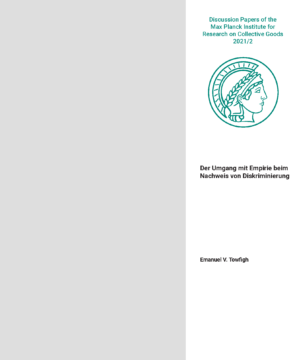Emanuel V. Towfigh, Der Umgang mit Empirie beim Nachweis von Diskriminierung
Discussion Papers of the Max Planck Institute for Research on Collective Goods, 2021/02
Download @ SSRN | Download from this Site
for publication in Mangold/Payandeh, Handbuch Antidiskriminierungsrecht, Tübingen 2021 (Mohr Siebeck)
Abstract
One of the challenges in anti-discrimination law is the difficulty to prove that discrimination has actually happened. Often, discriminatory experiences are disregarded as solitary cases or even as due to the particular sensitivity of an individual, with no recognition of underlying deeper structural or procedural issues that promote discrimination. It is therefore difficult to substantiate claims of discrimination in court or to prove the discriminatory outcome of procedures or practices. The evidence-based standards of empirical methods provide a toolbox to tackle these challenges – even if you have to keep in mind that in order to find evidence for discrimination, empirics have to statistically “discriminate”, i.e. categorize and operationalize characteristics that at the same time are at the very core of the discriminatory act, such as race, gender, age etc. (dilemma of difference).The article gives an overview of the structure of an empirical argument, pointing out issues that might arise specifically in researching discrimination. It shows that inferential statistics can help identify mechanisms of discrimination and uncover structural discrimination, thus helping to objectify the often controversial discussion of structural discrimination.
For practitioners in the judiciary, in the legislatures and in administration with little to no experience in dealing with empirical research it is vital to be aware of the mechanics and pitfalls of empirical research and the cognitive biases they may encounter. The article aims at empowering these practitioners to understand and evaluate the results and insights of empirical research in order to be able to facilitate anti-discriminatory decisions.
